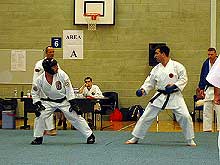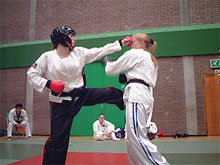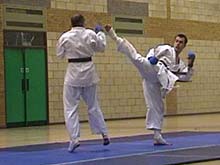|
Kumite (sparring) can be split into three basic groups: Ippon Kumite (One Step Sparring), Jiju Kumite (Free Sparring), and Shobu Kumite (Contest Sparring).
Ippon Kumite involves working with a partner. One partner delivers a pre-determined attacking technique while the other blocks or counters with a wide variety of kicks, punches sweeps and throws.
Jiju Kumite is the next level of sparring and should be used as a way of improving techniques. It should be thought of as "gentle sparring" and is primarily an exchange of ideas, done in a light, controlled manner with no points scored. Each partner should learn to look for and take advantage of openings where techniques can be applied.
Shobu Kumite is competition sparring and, at Zanshin Kai, generally uses WUKO rules. This involves a two minute fight under the watchful eye of a referee and a 'shadow' referee. Half points and full points are awarded for various techniques. The fight stops and the resumes after each scoring technique. The first karateka to score the equivalent of three full points, or with the most points at the end of the round, is the winner.
Students also have the opportunity to enter Light Continuous competitions which generally consist of a three minute round where the winner is declared at the end of the fight. Unlike Shobu kumite, the fight does not stop after each point scored, so stamina is essential. Contact is also likely to be harder than in Shobu, but it should not be full contact.
|






